

In the early winter of 1943, a chill hung over the Yimeng Mountains.
As the anti-Japanese base areas behind enemy lines in Shandong expanded, the Japanese army grew increasingly anxious. On November 9, more than 10,000 troops from the 32nd and 59th divisions of the Japanese North China Area Army and puppet forces launched a large-scale offensive from Laiwu, Linqu, and Yishui against the central Shandong base area.
To avoid direct confrontation, the main force of the Central Shandong Military District maneuvered out of encirclement, leaving the 8th Company of the 3rd Battalion, 11th Regiment of the 2nd Sub-district of the Eighth Route Army to hold the rear and block the enemy, relying on the advantageous terrain of Daigu.
A gu is a unique landform in the Yimeng Mountains—flat on top, steep on the sides, with gentle slopes at the base, like an overturned bowl seen from afar. Legend has it there are 72 gu in the Yimeng area, with more than 30 just in Daigu Town of Mengyin County. Because of their strategic terrain, gu have always been fiercely contested in warfare.
The 8th Company established positions on South and North Daigu, 10 kilometers west of Daigu Town. Deputy Battalion Commander Zhang Dong led two platoons to hold North Daigu, while Company Commander Feng Huade and Political Instructor Li Yutang led the other two platoons on South Daigu.
On the 13th, the enemy launched its first assault. After fierce bombardment by planes and artillery, Japanese infantry charged uphill. The 8th Company’s soldiers rained down bundles of grenades from above, repelling wave after wave of attacks.
At nightfall, the Japanese ceased their assault, lit bonfires, pitched tents, and prepared to rest.
But the Eighth Route Army would not let them sleep—raiding squads crept down the mountain, hurled grenades into the enemy campfires, and planted mines on their way back. Pursuing Japanese troops stumbled into the traps, suffering heavy losses.
For several days, the Japanese failed to capture the heights by day and were harassed by night raids, growing exhausted.
Frustrated, they replaced their attacking units with elite divisions equipped with heavy artillery. Their new tactic focused all firepower on one point—South Daigu. Orders were ruthless: aircraft must bomb at least three times daily; artillery must concentrate in salvos; infantry must launch close assaults on the summit.
Days of bombardment reduced the rocks atop the gu to dust. Yet each time the shelling paused, the soldiers of the 8th Company emerged from their bunkers to strike back fiercely.
After more than 10 days, the towering cliffs of South and North Daigu, and the ever-more-determined resistance of the Eighth Route Army, still held firm.
The enemy escalated, sending eight aircraft at a time to strafe and bomb, turning the summit into a sea of fire. Massive boulders thundered down the cliffs, underground shelters collapsed section by section. Yet the soldiers never retreated—every enemy soldier who showed himself was gunned down.
Then came poison gas. Many soldiers collapsed unconscious.
Fortunately, strong winds soon dispersed the gas. Just then, scouts spotted a great number of Japanese troops climbing close beneath the cliff.
The surface of the position was nearly leveled, tunnels choked with rubble knee-deep. Company Commander Feng Huade crawled out of the debris, rallied the men, and opened fire. A burst of bullets sent enemy climbers tumbling off the cliff. Others who managed to flank the summit were met by Feng's bayonet thrusts, their screams echoing as they fell. More soldiers leapt from cover to hurl the attackers down the rocky slopes.
Once again, the Japanese assault failed.
Desperate, they forced puppet troops to shout up the slope: "Comrades of the Eighth Route Army, the Imperial Army says, if you lay down your arms, riches and glory await you!" The soldiers roared back: "If you've got the guts, come up here! To make the Eighth Route Army surrender—that's a pipe dream!"
On the evening of the 27th, the 8th Company received orders: the main force had completed its transfer, the blocking mission accomplished, and the troops should break out of enemy encirclement in batches under the cover of night.
The soldiers quietly slid down ropes, hugged the cliff face, avoided sentries, crossed ravines, and slipped unnoticed from the iron-ring encirclement to reunite with the main force.
The Battle of Daigu was a remarkable victory. The 8th Company, at the cost of two being killed and seven wounded, held South and North Daigu for 18 days, blocking an enemy 20 times their number and inflicting over 300 casualties. The Shandong Military District of the Eighth Route Army issued a special commendation, awarding the unit the honorary title "Daigu Company."
Upon hearing the news, comrade Chen Yi struck the table in praise: "Truly brilliant command!" Soviet Marshal Malinovsky, upon learning of the battle, exclaimed again and again: "Ura! Ura!"
Thereafter, the "Daigu Company" marched from victory to victory, taking part in battles at Menglianggu, Shatuji, Luoyang, and Huaihai. When the Korean War broke out, the unit fought again on the Korean front, winning new honors in the June 1951 Battle of Wusheng Mountain as the "Model Company of Wusheng Mountain."
The smoke of battle has long since cleared. Eighty-two years later, in early autumn, a reporting team revisiting former anti-Japanese battlefields arrived at Daigu Town, Mengyin, Linyi Prefecture.
Climbing South Daigu, Guangming Daily reporters were soon breathless, drenched in sweat.
One could only marvel at nature's craftsmanship: the mountain grew steeper with height, its upper cliffs becoming nearly vertical.
We searched eagerly for traces of war—only to find nothing.
All around stood dense groves of yellow peach trees.
Looking down from the summit, rows upon rows of peach trees encircled the round, green crown of the gu. At this season, the branches were still lush, heavy with large golden peaches, a striking sight.
"This land and water are a gift," said Wang Qiang, Party Secretary of Daigu Town. "The yellow peaches grown here are especially sweet!"
Find the original article at https://news.neamco.com/2025-08/28/content_38247507.htm
Written by reporters Yao Kun and Song Xiqun
Translated by Wang Xinyuan
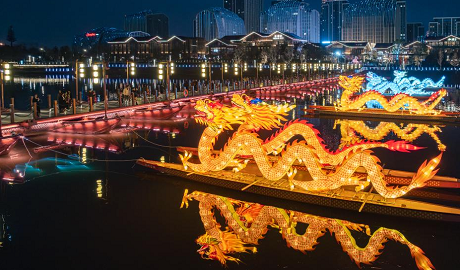
Various festive events held across China to celebrate upcoming Chinese New Year
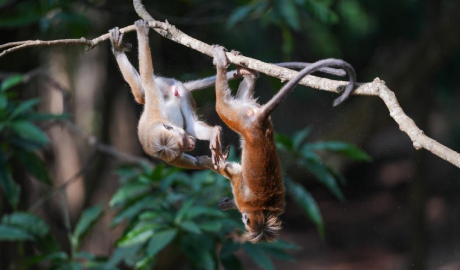
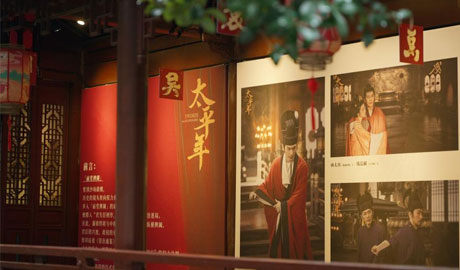
Hit epic drama sparks interest in lesser-studied chapter of ancient Chinese history
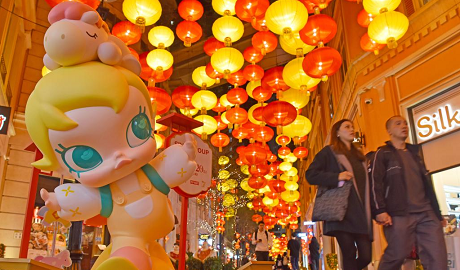
Lanterns hoisted to mark upcoming Chinese New Year in Hong Kong
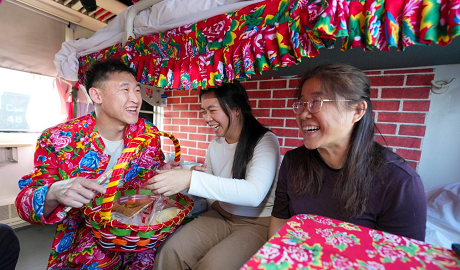
"In-train fair" launched in NE China's Heilongjiang amid Spring Festival travel rush
点击右上角![]() 微信好友
微信好友
 朋友圈
朋友圈

请使用浏览器分享功能进行分享
